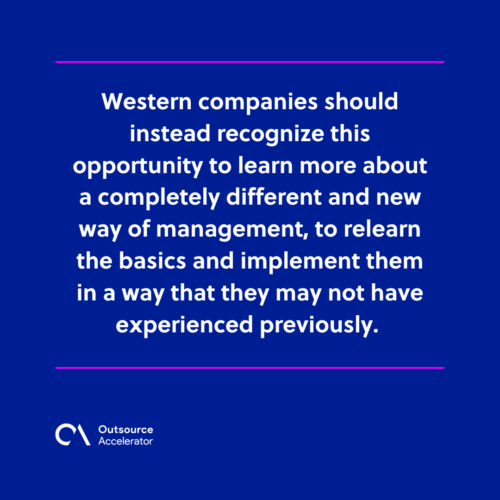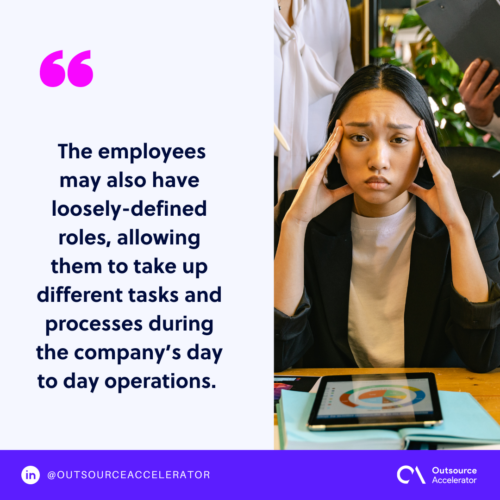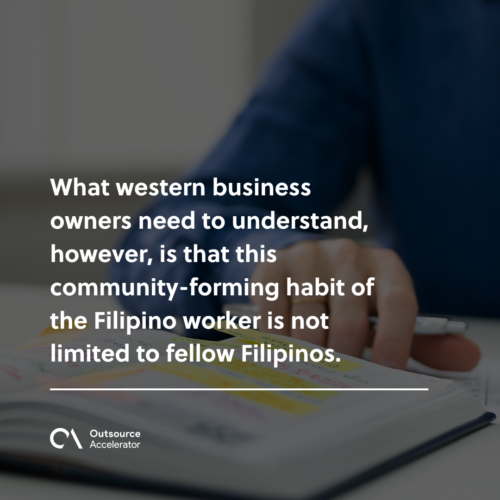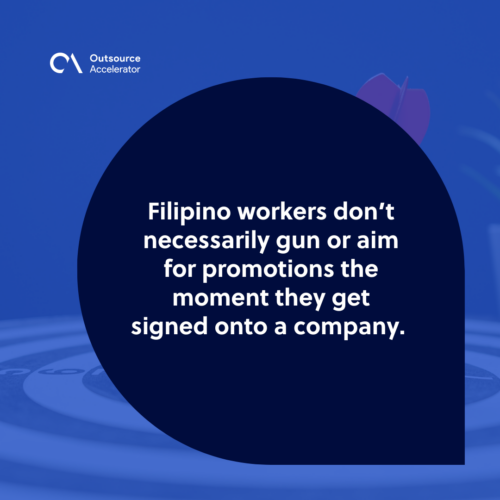How an outsourced Philippines team is different

Business Process Outsourcing to the Philippines allows western companies a unique and invaluable opportunity: to avail of a hardworking, highly-competent, and English-fluent workforce without having to shoulder the overhead and salary costs of hiring more in-house employees. This can easily result in sustained business growth as well as having the option of redirecting the company’s discretionary resources to more critical operations.
However, just like with any business strategy or cost-saving effort, outsourcing requires the careful handling and consideration of certain factors, otherwise it may end up costing an enterprising company more than it bargained for. One of these factors is the huge amount of cultural differences between the home company and an outsourced Filipino team. Only by recognizing these differences and taking the necessary steps to address them effectively can a western company truly take advantage of the unique opportunities that come with having an offshore team in the Philippines.
This article aims to help in that regard by providing tips designed to resolve those differences as efficiently and as smoothly as possible. By carrying out these tips, there will be a definite increase in the cohesion and synergy between the in-house company employees and the outsourced team.
But before we get to the tips, we here at Outsource Accelerator would like to first impart all company owners and managers with this important piece of advice: the way you should manage a Filipino team can be quite different from how you typically manage your in-house employees in the west. Even if you feel that you have a “better” way of doing things on your side of the pond, doing so without properly understanding Filipino work culture first can result in misunderstandings and miscommunications that could make outsourcing a nightmare for you and your team. It’s irresponsible to force your team from the Philippines to adjust to a completely new way of working, especially at the outset of your contract with them.
Western companies should instead recognize this opportunity to learn more about a completely different and new way of management, to relearn the basics and implement them in a way that they may not have experienced previously. While this may seem difficult and probably result in added expenses, we guarantee that the effort will be worth it in the long term. Think of it like how fast food giant McDonalds has to include local recipes and ingredients in their menus whenever they open a branch in a completely different part of the world. If they don’t open themselves up to trying new things and instead force the same menu on everyone all over the world, they’d be alienating a lot of potential customers and thus losing quite a lot of business.
With that said, here are the tips business owners from the west need to keep in mind when dealing with an outsourced team from the Philippines.

Have strict company structures, role definitions, and processes for your Filipino team.
Many modern western companies, especially those in the startup IT sector, operate with non-traditional or flat company structures. The employees may also have loosely-defined roles, allowing them to take up different tasks and processes during the company’s day to day operations. This kind of approach to business management allows for a more versatile and agile kind of workforce, one that can adapt to multiple roles and business demands.
The modern Filipino employee usually does not flourish under these circumstances, at least on the outset of their contract period with a western company. Instead of the jovial and informal nature of a flat company structure, an outsourcing team from the Philippines is more used to having clearly-identifiable managers, supervisors, and team leaders leading them and giving them instructions. They want the rigidity of strictly-defined team and employee roles. They also want processes and rules to be clearly defined and codified in manuals, HR codes of conduct, and other formal documents.
Why is this so, you might ask? Why would a workforce want to be willingly subjected into such a rigid and confining business and employee management style? The answer to this lies in the Filipino employee’s hardworking and hyper-focused nature. For example, they want to have strictly defined roles so that they can devote all their time and energy to learning how to perform their assigned jobs to the best of their ability. They will study all the materials they need and absorb all the lessons required of them to ensure that they can carry out their tasks efficiently and with great results. Having no strictly defined roles obviously hinders this.
This focus on excellence also explains their desire to have strict quality controls and a setup where they can receive instructions from direct superiors. They want to be clearly told what they need to do in order to help the company achieve its goals; and if they’re lacking in any areas, how to identify those areas and address their shortcomings. Your Filipino workers will also want someone whom they can direct their concerns and complaints to when they feel the need to speak up.
Again, having a flat hierarchy where everyone has the “same” rank or there are no team leaders works against them in this manner.
Some business owners may see this need for organization as overly tedious or resource-intensive, but the fact of the matter is that this kind of rigid structure will be something that all companies will need to adhere to once the business grows. This is simply doing it in advance—getting ahead of the curve, so to speak.

Foster a sense of community in the workplace.
Filipinos often flock together and form communities wherever they are. They form strong friendships and bonds with each other even if all they have in common is the place they work at or their function in a specific company. It comes to the point where coworkers are often included in a Filipino employee’s social circles, along with friends, relatives and loved ones. This is a clear contrast to typical social circles in western companies, where coworkers are more often seen as platonic friends or mere acquaintances than close friends.
What western business owners need to understand, however, is that this community-forming habit of the Filipino worker is not limited to fellow Filipinos. A manager or line supervisor from the UK, for instance, can easily earn the friendship of their Filipino outsourcing team by getting to know them through video conferences, informal emails, phone calls, or even on-site visitations. The same goes for the company’s in-house employees. Simply open the lines of communication and allow both parties to be genuine, social, and informal with each other, and bonds will be instantly made.
The benefits of taking the time to do this are numerous and immense. Instructions will be better understood once the Filipino team is emboldened to ask questions, clarifications, and advice before setting out to do tasks. Misunderstandings and potential conflicts will be minimized and snuffed out before they can even cause major problems down the line. Best of all, employee morale—always an important element to business success—will always be at high levels.

Don’t be afraid to lay out clear and proper demands and guidelines.
One of the potential pitfalls of having a Filipino workforce is that they can be a bit too dependent on the instructions of their superiors. Despite their highly-westernized culture and upbringing, many Filipinos are still reluctant to make waves or take initiative in a business setting unless specifically ordered or authorized to.
Being able to conform to accepted norms is drilled into Filipinos at a very young age, and it shows in their schools and offices. This doesn’t mean that they’re lazy or like to procrastinate, only that they’ll need to be encouraged to show initiative and use creative solutions in order to solve problems.
Otherwise, they will instead consult directly with their superiors or follow what’s outlined in the business manuals to solve the issues. This is great if the business owner wants their employees to do things strictly by the book, but not if they want their workforce to have a bit more initiative. If the latter is what’s desired, ensure that they know that they’re allowed to do such things.

Address or call out deficiencies in private. Never dress down your Filipino staff in public or in sight of their coworkers.
In the west, managers and supervisors may be accustomed to reprimanding or chewing out their subordinates in public. While this may be acceptable or even encouraged in a western office setting, it’s something that must be avoided in the Philippines, otherwise the manager risks humiliating the employee in question to the point that they’ll consider leaving the company.
This is because social shaming, or being shamed in public, is a very serious taboo in Filipino culture. Much like the Japanese, Filipinos have a sense of public honor and dignity to protect, an instinct to “save face”. Reprimanding them in public makes them lose face and will make them feel as if the manager doing the reprimanding is personally attacking their character and dignity. This will drastically affect their morale and trust in that manager.
Avoid this by ensuring that criticism, no matter how constructive or harsh, is delivered in private. As stated previously, Filipinos want to know how to improve their work to better satisfy their clients, so they’re not averse to receiving feedback or criticism. What they absolutely do not want happening is being lambasted out in public.
By doing this, companies in the west can ensure the loyalty and excellent work ethic of their Filipino workforce. Outsourced Filipino employees want to protect their public reputation, which is directly linked to the reputation of the company they are working with, so they’ll take every effort to avert huge PR disasters.

Invest in their career development to keep them happy and loyal.
Filipino workers don’t necessarily gun or aim for promotions the moment they get signed onto a company. They won’t be doggedly pursuing higher pay grades or cushier offices, even if they will no doubt appreciate it when it’s offered. Rather, they appreciate the fact that the pay comes regularly and is enough to meet all their financial needs. They won’t kick up a fuss even if their managers keep them in the same position for an extended amount of time, so long as the pay is prompt and the checks never bounce.
What, then, can keep them happy and loyal to the company if a manager or business owner can’t exactly use new positions or higher pay as motivation? The answer to this is training, whether it’s being sent on conventions and seminars to learn what the industry is up to, or to training programs to develop new skills. This shows them that the company is investing money into their skills and development as an employee. They also love the prestige of being presented with awards and bonuses for good performance.

Either keep your Filipino workforce small or go big.
Remember how we talked about the Filipino employee needing strict company structure and so on in order to prosper? This can be completely ignored if you keep your Filipino workforce to only a handful of employees, like in a 4- or 5-person team. It’ll be small enough that the usual concerns won’t crop up as often, and the members will be able to work efficiently with each other. They’ll also be able to go to you directly when they’re concerned about certain issues.
Conversely, if you expand your workforce to at least 100 people, you’ll still need those strict hierarchies and processes in place, but the effort will pay for itself easily rather than drain your resources.
The goal here, obviously, is to make the added investment of developing those company structures, manuals, and HR processes worth the expense. Doing it for a team with less than 100 members will be a lamentable waste of money, as you’ll have to hire even more staff just to handle their managerial needs. A small team with 5 to 10 members will be able to take care of itself, while a 100-man workforce will be profitable enough that the expense is cancelled out by revenue.
Conclusion
Cultural differences exist, there’s no getting around the fact. Trying to downplay them or ignoring them outright can seriously cause kinks in any business, especially in those that must deal with offshore teams. However, by addressing these differences in ways that may seem unique but are actually grounded in common sense, a business owner can take advantage of these differences and use them for the betterment of their company operations and bottom line in general.







 Independent
Independent




